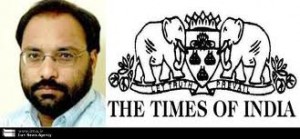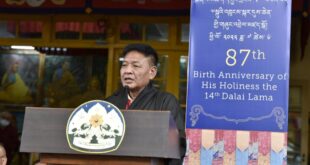Shobhan Saxena | The Times ofIndia
26 March 2012
Today at12.25 pm, a young Tibetan set himself on fire at a protest rally organized by the Tibetan Youth Congress at Jantar Mantar in the heart of the Capital. The Tibetans were protesting against the forthcoming visit of Chinese President Hu Jintao toIndia, when Jampa Yeshi suddenly emerged at the site, with his body covered in flames. Even as the fire ate his flesh and hair, the 27-year-old ran for about 100 metres and fell as some Tibetan activists and Delhi cops tried to douse the leaping flames. As Jampa was being carried to Ram Manohar Lohia hospital in a vehicle, the people at Jantar Mantar could see his badly burnt feet and flesh peeling off with the burns. Jampa is undergoing treatment in the ICU with 98% burns. He is battling for his life.
Japmpa Yeshi escaped from Tibet to India in 2006, and he has been living in New Delhi for the past two years.
 Today’s shocking incident happened as Tibetan activists from all over India gathered here to “urge the international community to intervene in the ongoing critical situation in Tibet and also protest against Hu Jintao’s upcoming visit for the 4th Brics summit”. Heads of states of Brazil, Russia, China and South Africa are on their way to take part in the Brics summit hosted byIndiaas a member of the group of emerging economies.
Today’s shocking incident happened as Tibetan activists from all over India gathered here to “urge the international community to intervene in the ongoing critical situation in Tibet and also protest against Hu Jintao’s upcoming visit for the 4th Brics summit”. Heads of states of Brazil, Russia, China and South Africa are on their way to take part in the Brics summit hosted byIndiaas a member of the group of emerging economies.
It’s difficult to say if Tibet will be on the minds of the five leaders, including our Prime Minister Manmohan Singh, when they meet to discuss important economic and development-related issues here on Thursday. But it’s certain that Hu Jintao (who is known among the Tibetans as the ‘Butcher of Tibet’ for his reign of terror as the governor of Tibet Autonomous Region in the 1990s) will flex his muscles to make sure that no one utters the ‘T’ word at the multilateral meeting.
But there are a few things the other Brics leaders should know about the ground situation in Tibet. Since March 2011, at least 19 Tibetans, mostly monks and nuns, have set themselves on fire to protest the Chinese government’s policies inTibet. In an appeal to the United Nations recently, some Tibetan organizations asked the world body to look into the situation in Tibet. “We the people of this world are deeply concern about the condition of people in Tibet and therefore we called for a UN-led fact-finding mission to observe the situation in Tibet,” they wrote in an appeal to the international community. But the world leaders, busy with their war mongering against Syria and Iran, have chosen to ignore the plea of Tibetans.
In past one year, the situation in Tibet has turned from bad to worse. According to a western tourist who recently returned from Lhasa, “Tibetans are disappearing; everyone is terrified about the bloodshed which seems inevitable.”
In a report to the Tibet News Network, the tourist wrote that, “Lhasa consists of approximately 1.2 million Han Chinese and approximately 200,000 Tibetans. The majority of these Tibetans live in an area which is now almost entirely enclosed by military compounds with walls between 10-16 feet; some with barbed wire. This isolation gives the impression of what the Warsaw Ghetto was like. Inside the “enclosed” area groups of armed soldiers, S.W.A.T. teams, and police patrol the streets 24 hours a day. Military drill songs can be heard throughout the day. S.W.A.T trucks and rows of 6 to 15 armored vehicles (tanks?) come through the area on a daily basis. Each vehicle has 3 to 4 soldiers at the opening turret, armed with assault rifles or machine guns aimed at the Tibetans.”
“All Tibetans must carry identification at all times. Tibetans residing in Lhasa are required to register with the police. There are approximately 134 new Police station checkpoints in Lhasa for random searches of pedestrians and vehicles. In addition to the military compounds in and around Lhasa, permanent military posts holding 1-10 armed soldiers have been established throughout the city.”
If this situation is not alarming and not as bad as what’s happening in Syria, then what is? Why are the world leaders silent on these crimes against Tibetans? Why has the world left Tibet to its fate? Why don’t they see a threat to the ideas of democracy, freedom and human rights in what’s happening in Tibet?
The people inside Tibet know that they are on their own. And they are refusing to give up despite the terrible situation they are in despite the fact that reports and footage coming out of Tibet has failed to shake the conscience of the international community.Recently, a video of self-immolation by Palden Choetso, a nun from a Tibetan area in southwestern China’s Sichuan province, made it to the outside world. In the video, the nun stands as the flames engulf her body and she later falls to the ground.
But this video didn’t get the coverage that was given to the footage of an Iranian girl, Nada Hosain, who was shot by unknown gunmen on aTehranstreet during disturbances there in 2008. At that time the western media — with support and guidance from their governments – tried to convert the tragic death of a young girl into a symbol of rebellion against the Iranian government. The ‘Wag the Dog’ tactic didn’t work and the so-called Iranian rebellion died down in a few weeks. The world’s top TV channels and newspapers had no hesitation in running an amateur video on their network as an authentic image; they didn’t bother to verify what exactly happened. But when it comes to the image of a burning Tibetan nun, they raise their journalistic standards.
Of course, nobody wants to rub the Chinese the wrong way.Chinamay be a one-party dictatorship whose brutality has few parallels in modern history, but it’s also the last hope of global capitalism, which is sinking by the day. It’s the world’s factory and bank with hard cash.
But ignoring what’s happening in Tibet will only bolster the Chinese regime, which is a dangerous combination of predatory capitalism and orthodox communism.
It’s time a world leader showed courage and mentioned Tibet at an international forum. It’s time the world told China that its crimes against Tibet will not be tolerated anymore. Recently, Tibetan Prime Minister in-exile Lobsang Sangay expressed concern over rising Chinese military repression against Tibetans and urged the United Nations to send a fact-finding delegation to China to investigate its hardliner policies. “We urge the international community and the United Nations to send fact fighting delegations to Tibetan areas and the Chinese government should also do their own investigation, an objective, truthful investigation which will clearly reveal that their hardliner policies is not working and is ought to be revised and (they should) introduce more moderate policies towards the Tibetan people,” Sangay said.
This week, India voted against Sri Lanka for its war crimes against its minority Tamil populations. Can we expect India to show similar courgae against China?
After all, how many Tibetans have to burn themselves to death before the world wakes up to their plight?


